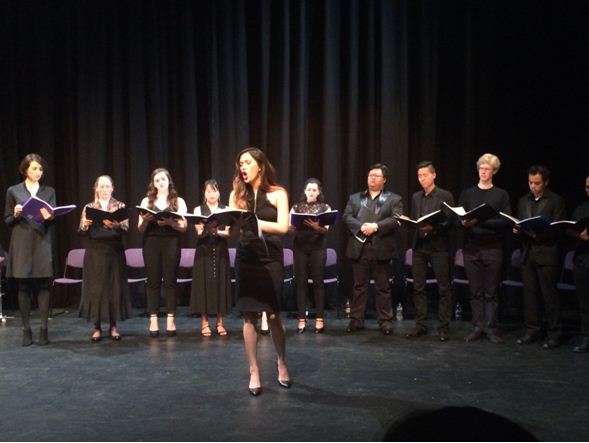Puccini's Turandot reimagined
- By Rory Howard
 0 Comment(s)
0 Comment(s) Print
Print E-mail China.org.cn, August 3, 2015
E-mail China.org.cn, August 3, 2015
| Christine Allado as Turandot [photo by Rory Howard] |
Puccini's opera, Turandot, about a cold-hearted Yuan Dynasty princess and a nameless prince has been played countless times since its first showing in Paris, 1926, but despite the play's Beijing setting, and the presence of Dynastic rule, few productions have adapted the opera's score for Chinese instruments and with an awareness of Chinese history and culture.
As part of the "Tete-a-tete Opera Festival" in London, Hong Kong descendant and theatre director Jonathan Man has come together with various people who have studied Chinese music and opera to further adapt Turandot to fit its Chinese setting and the time period.
Ambitiously, the SOAS Silk and Bamboo Ensemble, headed by composer Ruth Chan, use Chinese percussion and a zither to turn Turandot in to an opera with a sound that one might have heard at the royal court of the Yuan dynasty (1271 - 1368). Despite the traditional Chinese accompaniment to Turandot, the audience can still pick out the notes of Puccini's opera, notably of course in the ensemble's version of Nessun Dorma which many people will recognise from Luciano Pavarotti's famous performance at the 1990 FIFA World Cup in Italy.
The singing has also been adapted, not only by translation but also by the academic input of Kim Hunter Gordon and Thomas Stell who have both studied Kunqu opera. Kunqu is one of the oldest recorded forms of Chinese opera, and although it was a cultural enjoyment of the Ming Dynasty (1368-1644), it may also have been performed in the royal courts of the Yuan.
Jonathan Man and Ruth Chan have clearly worked hard at bringing cultural authenticity to the opera by including such instruments and singing styles to the production, but an essence of the original work of Puccini pervades the performance beyond the recognisable notes played by the ensemble. Tenor Henry Ka-Lok Ngan holds the audience captivated as the lovelorn character Prince Calaf and, though singing in Mandarin for the first part of the show, there is still much of an Italian operatic tradition about his sonorous voice. Christine Allado's impressive performance as the titular Turandot also holds true to Puccini's original by retaining an essence of European operatic tradition, opposed to the Chinese opera styles of other characters and the chorus.
Turandot Reimagined is an ambitious attempt at bringing an Italian opera and its Chinese context together, and from this initial look at a work in progress, Jonathan Man and Ruth Chan are on their way to giving new life to an old show.
Asked about what will happen to Turandot Reimagined after the "Tete-a-tete Opera Festival", director Jonathan Man said that he hopes to take the Mandarin version to a larger audience and eventually to China.







Go to Forum >>0 Comment(s)